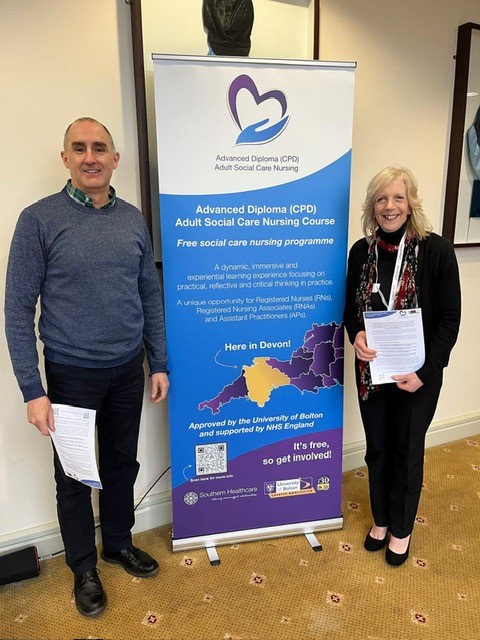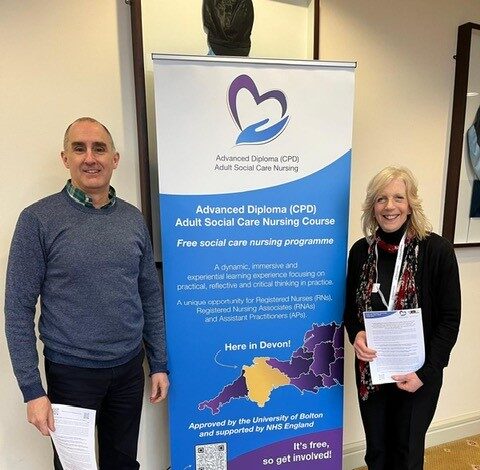A unique, free, scheme giving nurses, nursing associates and assistant practitioners the opportunity to enhance their careers and achieve a nursing diploma in social care has been launched in Devon.
The Advanced Diploma (CPD), in Adult Social Care Nursing has been designed by care provider, Southern Healthcare (Wessex Ltd), which has four award-winning homes in the county. The scheme has been developed in collaboration with a satellite centre of the University of Bolton, based at Petroc College in north Devon.
The innovative training is supported by NHS England and is open to Registered Nurses, Registered Nursing Associates and Assistant Practitioners, currently working in nursing and care home environments.
It is predominantly an online learning programme together with an in-workplace face-to-face assessment of practice and competencies. Also included are ten face-to-face clinical days, ( at Southern Healthcare’s dedicated training centre, Eden House in Dawlish or at Petroc College, Barnstaple), led by a clinical nurse tutor or invited specialist, guiding the nurses and assistant practitioners to take a ‘deep dive’ immersion of critical practice and skills. This all goes hand in hand with an interactive learning application accessible on the learner’s mobile phone.

Margot Whittaker, Southern Healthcare’s Director of Nursing and Compliance, says: “We are very excited to be launching the Advanced Diploma (CPD) in Adult Social Care Nursing This course has been created to help aid nurses, nursing associates and assistant practitioners within Social Care to understand the complexity of their job role, and supports them towards reaching nursing wellbeing, not only for themselves, but also for residents and families through person centred approaches and high quality clinical practice.
Until now, there has been no specific recognised qualification for nurses working in a nursing home environment. All general nurses are mostly trained within hospital environments which support the more medical models of care and nursing. Whilst in social care, the nurse is looking after a person within their own home or care environment, and so the more regimental task- focused way of nursing is not appropriate, or appreciated, within this more relaxed setting, particularly for those with a dementia or who are at the end of life.”
Margot adds that current models of care tend to encourage care workers to focus on the deficits of people rather than upon their capabilities, which also goes against the regulatory requirements now being requested by the Care Quality Commission, (CQC)
“This course is ground-breaking and has been designed to address sectorial changes within the health and social care environment. It is a dynamic and experiential learning experience focusing on practical, reflective and critical thinking in practice.
Learning is orientated towards clinical practice as well as understanding the needs of residents and their families, promoting values such as kindness, compassion, and relationship/person-centric well-being. It explores all aspects of adult social care nursing with its day-to-day challenges, deliberating on situations and successful resolutions.
We want to see social care nurses striving towards this with pride. We feel they should be recognised within a standard as specialists in social care nursing and be fully equipped to work holistically at a very high level. This course has been met with tremendous enthusiasm from our own nurses and healthcare professionals, both locally and nationally. A new era of nursing is dawning, and we are delighted to be very much part of it in supporting our amazing social care nursing workforce”.
The programme has been co-authored with Shaun Kershaw, Senior Lecturer in Nursing at the University of Bolton Satellite Centre for Nursing at Petroc College in Barnstaple. He says: “The HE Level 6, and 7 Advanced Diploma will focus on helping nurses, nursing associates and assistant practitioners to deliver high-quality, compassionate care in nursing home environments. Proficiency within clinical skills and competency within identified elements of professional practice will be gained with the support of employer-led supervisors and assessors. Putting the course together since its inception five years ago has not been without its challenges, but we are thrilled that the programme is now coming to fruition.”
Support for diploma has come from senior figures in the NHS. Gail Wilson, Regional Senior Nurse at NHS England (South West), Workforce Training and Education Directorate says: “There is a demand for this course to ensure nurses working in the sector develop the skills required to manage increasingly complex social care clients. It is also required to aid recruitment and retention, as it will support nurses to be fulfilled in their roles and will give social care nurses the same professional recognition as community nurses.”
Darryn Allcorn, Chief Nurse and Director of Integrated Professions, University Hospitals Plymouth NHS Trust says: “There is a significant gap in developing the skills sets and investing development in social care nursing.Tis programme addresses the gaps and will go a significant way to address the current recruitment and retention strategies, whilst enhancing the skills within social care and specifically residential settings.”
The first cohort starts in August 2024 and then in December 2024, so please get in touch if you are interested: Margot.whittaker@southernhealthcare.co.uk or s.kershaw@bolton.ac.uk
